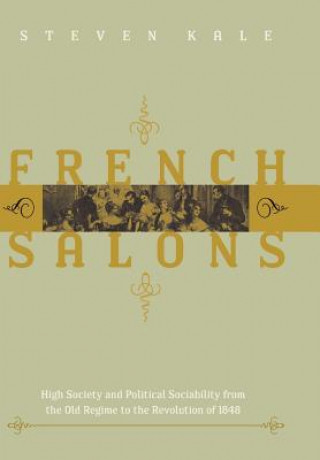
Delivery
Shopping guide





Doesn't suit? No problem! You can return within 30 days
 Gift voucher
any value
Gift voucher
any value
You won't go wrong with a gift voucher. The gift recipient can choose anything from our offer.
French Salons
 English
English
 166 b
166 b
 Delivery to Austria
Delivery to Austria
30-day return policy
You might also be interested in


Among the most enduring of French cultural institutions, the salon, is among the most misunderstood. Seen primarily as a venue for apolitical social gatherings, the salon's influence is generally believed to have ended during the French Revolution. In French Salons, Steven Kale challenges conventional thinking about the salon. Drawing on an impressive range of primary sources, he offers a nuanced history of this institution from the eighteenth century through the Revolution of 1848 which emphasizes continuity and evolution over disjuncture and highlights its shifting political character and relevance. Salons, Kale shows, originally provided opportunities for the exchange of literary and philosophical ideas among the French aristocracy. Central to the maintenance of salon culture were salonnieres, aristocratic women such as Madame de Stael who opened their homes to fellow elites and nurtured a sociability that united the members of high society. Salons provided ready-made venues for aristocratic politics during the early years of the French Revolution, when salons were transformed into places where the upper classes could express their political opinions and concerns. Even at the height of the Terror, salons did not dissolve but, rather, were displaced as aristocrats moved their social networks of influence to such cities as Coblenz, Brussels, and London. Napoleon sought to manipulate salon culture for his own ends, but with his fall from power, salons reemerged and proliferated. Although never intended to serve as political clubs, salons became informal sites for the cultivation of political capital and the exchange of political ideas during the Bourbon Restoration and the July Monarchy. By 1848, the conditions that sustained aristocratic sociability declined, and salons became increasingly marginal to French public life. At the same time, new political institutions-parties, the press, legislative bodies-emerged that more effectively disseminated and shaped political opinion and led to real political change. Challenging many of the conclusions of recent historiography, including the depiction of salonnieres as influential power brokers, French Salons offers an original, penetrating, and engaging analysis of elite culture and society in France before, during, and after the Revolution.
About the book
 English
English


 Contact
Contact How to shop
How to shop
























